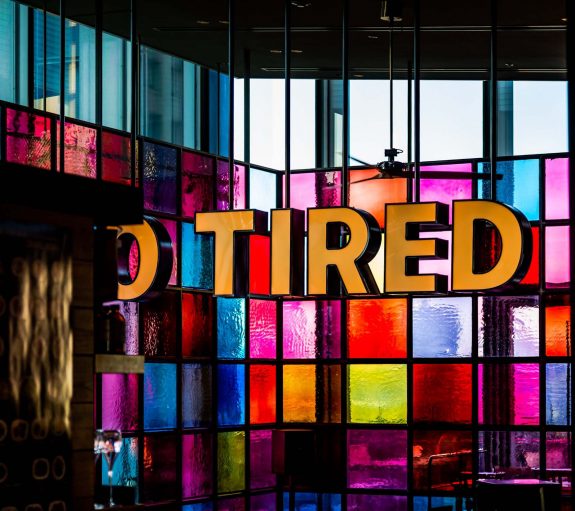
How do you deal with concentration fatigue in this new, more-digital, world?
The Coronavirus crisis means that lots of day to day activities and cultural experiences are now taking place in a digital realm, from catching up with your Mum, to watching a live-streamed gig.
For many this constant digital connection is tiring and people are experiencing ‘concentration fatigue’.
This change provides both a challenge and an opportunity – to build a more inclusive digital culture and make our online experience more accessible. Not only in terms of the tech, but also in termss of our attitudes and approaches to using it.
The new norms we build around our digital spaces will be as much a part of what makes them inclusive and accessible as the code behind them.

This thread on twitter from student Charlotte Hyde, who is the Disabled Student’s Officer at Reading University Students’ Union, sums this situation up perfectly and offers some much-needed expert advice from her personal experience.
I've been watching so many hearing people discover concentration fatigue for the first time over the quarantine. As a deaf person, here are my top tips:
— Charlotte Hyde (@charlhyde) April 26, 2020
Charlotte’s Tips for Concentration Fatigue
First up, know your limits and take breaks:
1) Figure out your limits. I can't go for longer than about 40 mins (if that) of constant listening before my brain goes kaput.
2) Now you know when your brain will give up, take a break (if you can). Go and make a cup of tea. Fuss the dog. Spend five to ten minutes in silence.
— Charlotte Hyde (@charlhyde) April 26, 2020
Next Char shares some advice that is very close to our hearts… listen to music:
3) Listen to music. My Spotify minutes rivaled my hearing friends' at 120K last year because I use music to relax between listening sessions. Stick something on that is easy for you to listen to, you know the words to and will make you feel positive.
— Charlotte Hyde (@charlhyde) April 26, 2020
Like the Scouts and Guides, be prepared…Plan ahead and always have a cuppa ready.
And another important one – do whatever you can to improve your audio.
5) Improve your audio quality. For me, that may be utilizing a loop system, using my Roger Pen or a BSL interpreter. For you, that may be investing in a better set of headphones. It will be worth it in the long run – I promise.
— Charlotte Hyde (@charlhyde) April 26, 2020
We can’t emphasise this next one enough… ask for what you need.
Not only might you need an hour off from everyone at some point, you might need a break during a meeting, or a pause in the working day. That’s ok.
The flip side is that if you are the person calling a meeting or hosting an event, make sure you check in with your participants’ requirements and be mindful of their needs.
6) Communicate your needs. If you need a break, ask for one. Don't suffer in silence.
You may need more space away from your family to recharge. If this is the case: please ask for it! An hour on your own can make such a difference.
— Charlotte Hyde (@charlhyde) April 26, 2020
Self care is important. Be kind to yourself.. and we would add, be kind to others too! We are all on a learning curve and trying to work/live through a crisis, so let’s do our best to support, include and care for each other.
8) Finally: please be patient with yourself. Your body can only do so much and expecting it to perform miracles rarely works. Make sure you are doing something fun to relax each evening.
I hope this has been somewhat helpful😀
— Charlotte Hyde (@charlhyde) April 26, 2020
Yes @charlhyde this has definitely been helpful and thanks so much for saying we could share your thread!
Finally, not only has Charlotte covered a huge amount of useful stuff for anyone who is feeling the Zoom burnout, there’s also lots of useful stuff in the replies and comments too, like these handy…
…Bonus tips!
Also @JessicaOOTC's video "I'm too tired to listen to you" goes over some really helpful tips, as well as explaining what concentration fatigue is like for deaf people: https://t.co/j0B0hMfyvc
— Charlotte Hyde (@charlhyde) April 27, 2020
Have you experienced concentration fatigue? Do you have tips for dealing with it?
Leave us a comment or drop us a tweet… at your own pace and when you feel ready, of course.
Read More
Digital Accessibility – a call to action



